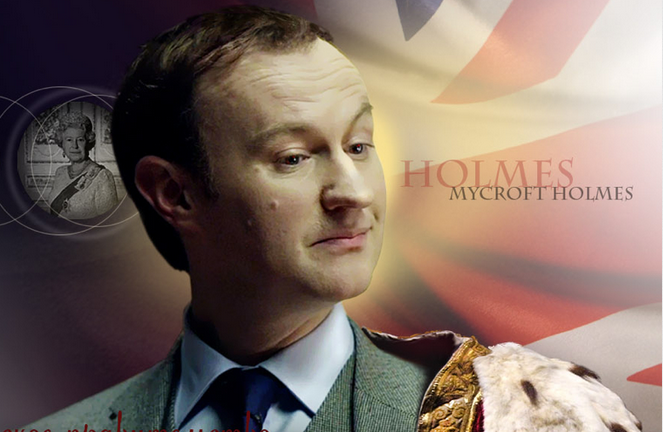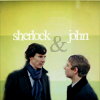
BBC Sherlock Fan Forum - Serving Sherlockians since February 2012.
- Wholocked
- Moderator
 Offline
Offline 
- From: Australia
- Registered: March 7, 2012
- Posts: 1,811
Pet Peeves - spelling and grammar
In the Pilot discussion thread, we ended up digressing into spelling and grammar pet peeves so I thought I'd start a new thread for just that discussion.
So far we have the following:
"Davina" wrote:
Just one (pernickety) point. Canon refers to the works of ACD, cannon is what you shoot balls with (cheap, childish laugh).
"ancientsgate" wrote:
My pet peeve is lose/loose, which I see used incorrectly all the time, everywhere. Those two words don't even sound the same, but almost never are spelled right.
"Carol the Dabbler" wrote:
My current "favorite" is "free reign" as a substitute for "free rein." I suspect there are two reasons -- one, "reign" kind of makes sense -- and two, not many people these days have ever laid the reins loosely across old Dobbin's neck and trusted him to head for home.
Personally, my biggest pet peeve is definitely (it does not have an a in it!!). I also take issue with the misuse of their/they're/there and where/we're/were and also whether/weather.
ETA: Oh! And also you're/your!
Last edited by Wholocked (September 18, 2012 4:39 am)
-------------------------------------------------------------------------------------------------------------
I dislike being outnumbered. It makes for too much stupid in the room

- Davina
- Moderator
 Offline
Offline 
- From: The Only Way is Essex UK
- Registered: February 9, 2012
- Posts: 9,714
Re: Pet Peeves - spelling and grammar
The misuse of apostrophe S'. (Just to make the point!).
![]()
---------------------------------------------------------------------------------------------------------------------------------------------
Don't make people into heroes John. Heroes don't exist and if they did I wouldn't be one of them.

- sherlockskitty
- Official Blogger
 Offline
Offline 
- From: under sherlock's chair
- Registered: May 13, 2012
- Posts: 1,787
Re: Pet Peeves - spelling and grammar
Oh yes, to all of those above!! but what about when people spell the same word differently? Like, we in USA spell the word RUMOR as such; but some people spell it Rumour. Which is correct? No offense to anyone, but I am just curious. Theater is spelled like theatre in the old days...just an example.
~~~~~~~~~~~~~~~~~~~~~~~~~~~~~~~~~~~~~~~~~~~
SHERLOCK!!!!!!
- Davina
- Moderator
 Offline
Offline 
- From: The Only Way is Essex UK
- Registered: February 9, 2012
- Posts: 9,714
Re: Pet Peeves - spelling and grammar
We in the UK spell theatre like that not theater. Colour, rumour, neighbour are other examples as are program, catalog.
As to why Americans have this spelling the easiest point of reference is:
www.wikipedia.org/wiki/Simplified_Spelling_Board
Andrew Carnegie and President Theodore Roosevelt (yes he of Teddy Bear fame) have a role to play, as you will see.
![]()
Last edited by Davina (September 19, 2012 2:31 pm)
---------------------------------------------------------------------------------------------------------------------------------------------
Don't make people into heroes John. Heroes don't exist and if they did I wouldn't be one of them.

- Carol the Dabbler
- Cipher Expert
 Offline
Offline 
- From: Indiana, USA
- Registered: July 21, 2012
- Posts: 135
Re: Pet Peeves - spelling and grammar
Glancing over that list, I see only a few spellings that have become the standard -- we do use fetus (instead of foetus), gram (gramme), catalog (catalogue), mold (mould), donut (optional for doughnut), hiccup (hiccough), center (centre), and meter (metre).
But actually, I think it was Noah Webster (of dictionary fame) who got spelling simplification started over here a hundred years earlier, circa 1800. A lot of his ideas failed to catch on, but a fair number of them are with us to this day -- Wikipedia lists defense (rather than defence), center (centre), traveler (traveller), color and favor (colour, favour), and wagon (waggon).
As to which spellings are correct -- that depends on which country you're in!
Thanks for starting this thread, Wholocked!
- Arya
- Cipher Expert
 Offline
Offline 
- From: Iowa, USA
- Registered: July 4, 2012
- Posts: 173
Re: Pet Peeves - spelling and grammar
The one that annoys the most is effect vs. affect.
In the US, many people/theatres still spell theatre with the re. I remember when I was little I got theatre wrong on a spelling test because I spelled it with a re ![]()
- Wholocked
- Moderator
 Offline
Offline 
- From: Australia
- Registered: March 7, 2012
- Posts: 1,811
Re: Pet Peeves - spelling and grammar
Ah yes, effect vs affect. I still get them confused. There are other words that are like those - although apparently my morning coffee hasn't kicked in yet because I'm having a total mental blank on what they are.
The other thing that irritates me in this time of Twitter & SMS conversations is that constructing whole sentences, with capitalisation and punctuation, seems to have gone the way of the dodo. I've heard of people sending work-related emails in text-speak. EW.
Edit: Missed a comma in my sentence about punctuation. That just won't do!
Last edited by Wholocked (September 19, 2012 12:26 am)
-------------------------------------------------------------------------------------------------------------
I dislike being outnumbered. It makes for too much stupid in the room

- •
- kazza474
- High Functioning Sociopath
 Offline
Offline 
- From: Australia
- Registered: February 9, 2012
- Posts: 2,845
Re: Pet Peeves - spelling and grammar
I would like to point out one that annoys me, I've read it twice in one thread today........
"You're English is perfect" ......... arrrgghh!!!!!!!! (Note : exclamation marks are fully warranted in this instance.)
*deep breath*
This translates to "You are English is perfect", I think NOT!
Your English needs a brush up!
![]()
*All said in good humour*
____________________________________________________________________________________________
Also, please note that sentences can also end in full stops. The exclamation mark can be overused.
Sherlock Holmes 28 March 13:08
Mycroft’s popularity doesn’t surprise me at all. He is, after all, incredibly beautiful, clever and well-dressed. And beautiful. Did I mention that?
--Mark Gatiss
"I know that you believe you understand what you think I said, but I’m not sure you realize that what you heard is not what I meant."
Robert McCloskey
- Wholocked
- Moderator
 Offline
Offline 
- From: Australia
- Registered: March 7, 2012
- Posts: 1,811
Re: Pet Peeves - spelling and grammar
Hehe I noticed it too Kazza ![]()
Those words I was thinking about earlier came to me today and then I forgot again! ARGH
-------------------------------------------------------------------------------------------------------------
I dislike being outnumbered. It makes for too much stupid in the room

- •
- Davina
- Moderator
 Offline
Offline 
- From: The Only Way is Essex UK
- Registered: February 9, 2012
- Posts: 9,714
Re: Pet Peeves - spelling and grammar
Beware also the dreaded autocorrect. When I want to write its it always, always tries to change it to it's, even when it makes no sense whatsoever.
![]()
---------------------------------------------------------------------------------------------------------------------------------------------
Don't make people into heroes John. Heroes don't exist and if they did I wouldn't be one of them.

- KeepersPrice
- Official Blogger
 Offline
Offline 
- From: Andover, Massachusetts
- Registered: June 8, 2012
- Posts: 1,721
Re: Pet Peeves - spelling and grammar
A lot of people write 'alot'; but it should be 'a lot'. I always have trouble with 'affect' and 'effect'and have to check it almost every time. And many times I find myself adding an apostrophe to 'its' when I shouldn't.
My 6th grade teacher used to get furious if anyone said "snuck" - such as, "The theives snuck in through the window". He said there was no such word and that to be correct it should be 'sneaked'. Losing battle I'm afraid. 'Snuck' seems to be in popular usage and I do see it in the dictionary.
'lesser' vs. 'fewer'
'lie' vs.'lay'
'who' vs. 'whom'
i.e vs. e.g
The list goes on and on....
---------------------------------------------------------------------------------------------------------------------------------------------
And I said "dangerous" and here you are.
You. It's always you. John Watson, you keep me right.

- Davina
- Moderator
 Offline
Offline 
- From: The Only Way is Essex UK
- Registered: February 9, 2012
- Posts: 9,714
Re: Pet Peeves - spelling and grammar
All the above plus spelling etc. as ect. ![]()
![]()
---------------------------------------------------------------------------------------------------------------------------------------------
Don't make people into heroes John. Heroes don't exist and if they did I wouldn't be one of them.

- LoveBug54
- The Game Is On
 Offline
Offline - From: Minnesota
- Registered: June 7, 2012
- Posts: 65
Re: Pet Peeves - spelling and grammar
What gets me is when people use "less" when they should use "fewer."
Example: Susie has three apples and Bobby has five apples. Susie doesn't have less apples, she has fewer, dumbass.
- Wholocked
- Moderator
 Offline
Offline 
- From: Australia
- Registered: March 7, 2012
- Posts: 1,811
Re: Pet Peeves - spelling and grammar
KeepersPrice wrote:
"The theives snuck in through the window".
Thieves ![]()
-------------------------------------------------------------------------------------------------------------
I dislike being outnumbered. It makes for too much stupid in the room

- •
- Carol the Dabbler
- Cipher Expert
 Offline
Offline 
- From: Indiana, USA
- Registered: July 21, 2012
- Posts: 135
Re: Pet Peeves - spelling and grammar
First off, can y'all tell me whether "I couldn't care less" is a standard expression anywhere except the US? (Just in case it's strictly American, it means, "It would be literally impossible for me to care any less than I do now, because I already don't care even a tiny bit" -- or in fewer words, "I don't care.")
Anyhow, the typical American pronunciation of "couldn't" is more like "could'n" -- and then a lot of people kind of swallow the "n" so that it's difficult to tell the difference between "could" and "couldn't" when spoken. Which presumably explains the current trend toward saying "I could care less" -- which doesn't even make sense.
Even though I can understand the mechanism for this misunderstanding -- why can't people just think?
- Wholocked
- Moderator
 Offline
Offline 
- From: Australia
- Registered: March 7, 2012
- Posts: 1,811
Re: Pet Peeves - spelling and grammar
Yep we use that phrase here too and I've heard people say "I could care less" which yes, just perplexes me! It doesn't make any sense to say it that way ![]()
-------------------------------------------------------------------------------------------------------------
I dislike being outnumbered. It makes for too much stupid in the room

- •
- Davina
- Moderator
 Offline
Offline 
- From: The Only Way is Essex UK
- Registered: February 9, 2012
- Posts: 9,714
Re: Pet Peeves - spelling and grammar
The phrase is also a standard English phrase. Since the Catherine Tate show there is a tendency to just say, 'bovvered?'
The dropping of the final, and often central 'T' sound of words is very, very common where I live. People will correct children, as an example, by saying, 'Sound your Ts'. Another common trait is to put a K sound instead of a G sound at the end of words and an F instead of a V e.g. 'Nufink' instead of 'nothing'. It is also common to drop the H sound at the start of words e.g. ' 'aven' ' rather than 'haven't'. The final T is replaced by that strange glottal stop type 'swallowing' as you have mentioned. This happens in the middle of words such as 'water' which become 'wa'er'. That's our short linguistics lesson for today.
![]()
---------------------------------------------------------------------------------------------------------------------------------------------
Don't make people into heroes John. Heroes don't exist and if they did I wouldn't be one of them.

- ancientsgate
- Reichenbach Survivor
 Offline
Offline 
- From: New Hampshire, USA
- Registered: June 8, 2012
- Posts: 5,532
Re: Pet Peeves - spelling and grammar
Wholocked wrote:
I also take issue with the misuse of their/they're/there and where/we're/were and also whether/weather. ETA: Oh! And also you're/your!
I think you meant where/we're/wear??
And I can add yore to the list of you're, your.
I was reading a fan fic the other day when someone prized something out of another character's hands. Come find out, that's the American spelling of prised. I didn't know that... and I'm American. I would always have spelled it prised. ??? Funny, because I would always use prize for an award, a prized wine, etc.
One of my last fandoms was a sci-fi universe, within a military setting (Stargate SG-1). I cannot tell you how many fan fics I read where the characters got their weapons from the ordinance officer-- that should be ordnance. And they came upon aliens making a sacrifice at an alter.... um, no, that's an altar.
- ancientsgate
- Reichenbach Survivor
 Offline
Offline 
- From: New Hampshire, USA
- Registered: June 8, 2012
- Posts: 5,532
Re: Pet Peeves - spelling and grammar
"Carol the Dabbler" wrote:
My current "favorite" is "free reign" as a substitute for "free rein." I suspect there are two reasons -- one, "reign" kind of makes sense -- and two, not many people these days have ever laid the reins loosely across old Dobbin's neck and trusted him to head for home.
Reign, rein, rain. That can be a tough one, even for native speakers, although most of us would not misuse rain, I presume.
- ancientsgate
- Reichenbach Survivor
 Offline
Offline 
- From: New Hampshire, USA
- Registered: June 8, 2012
- Posts: 5,532
Re: Pet Peeves - spelling and grammar
sherlockskitty wrote:
Oh yes, to all of those above!! but what about when people spell the same word differently? Like, we in USA spell the word RUMOR as such; but some people spell it Rumour. Which is correct? No offense to anyone, but I am just curious.Theater is spelled like theatre in the old days...just an example.
Those are all British vs. American spelling differences. Neither is "correct" IMO-- just the common usage of whichever countries. I don't know why the American spelling changed from the original Brit back hundreds of years ago, but it surely did. Long, long time ago now.
Canadians and Australians spell things the Brit way, but I don't know if there are any exceptions to that.
Theatre is not "old days". It's British. It's theater in the US.
Not just rumor, color, flavor, but we often use z where Brit English uses s. Recognize, prize, idealize, realize, etc.
And to add to this list, accept, except. I see those mixed up all the time.

 1
1